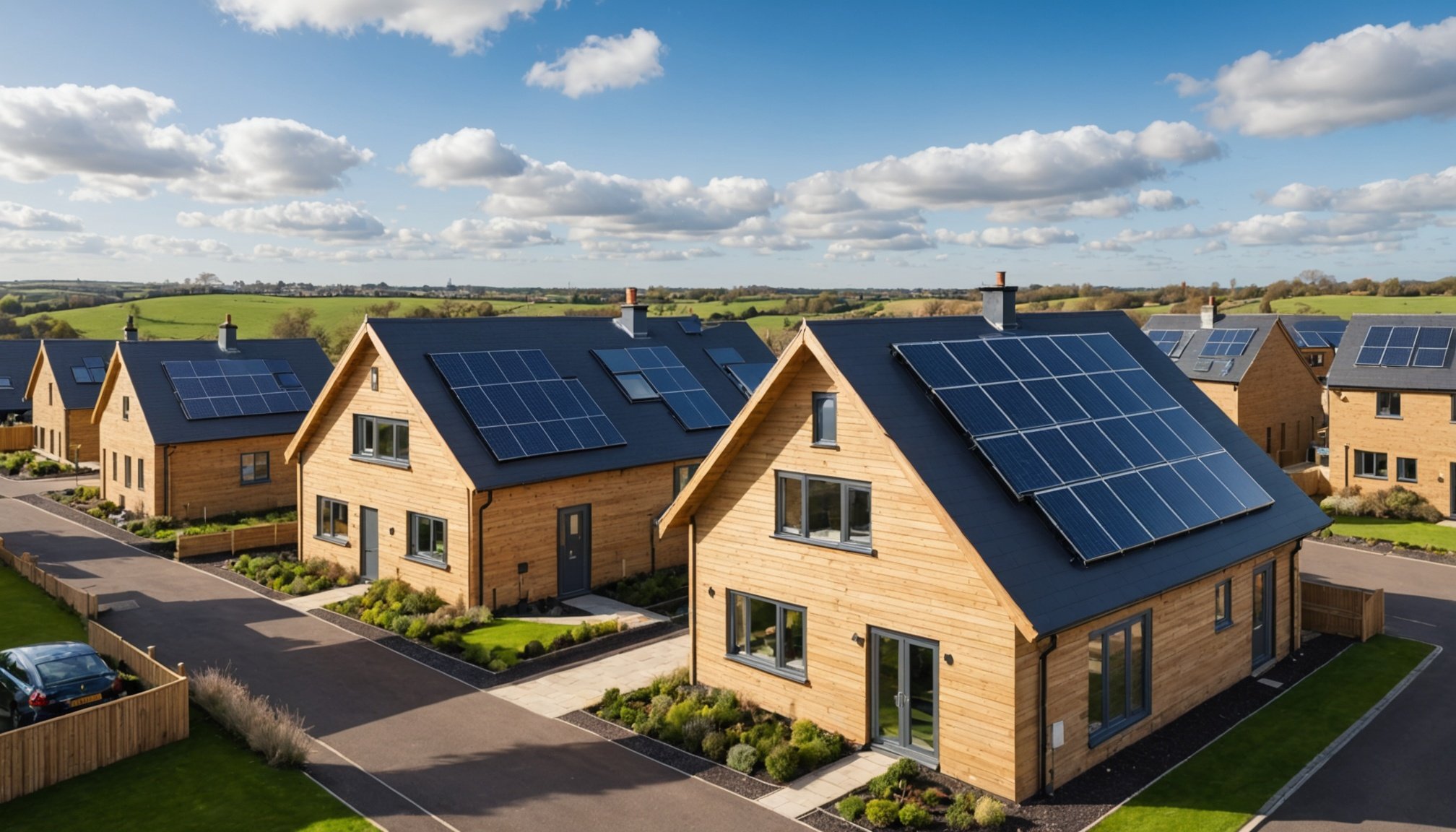Overview of Renewable Energy in the UK Property Sector
The importance of renewable energy in the UK property sector cannot be overstated, as it plays a critical role in reducing carbon footprints. With the increasing awareness around climate change, sustainable housing has become an imperative. In recent years, there has been a noticeable shift towards implementing renewable energy solutions in new developments. UK property developers are actively seeking ways to integrate these solutions in a bid to promote environmentally friendly living spaces.
Current trends highlight a growing commitment among developers to incorporate renewable technologies such as solar panels and wind turbines. These efforts are indicative of a broader move towards reducing energy consumption and enhancing sustainability in housing.
Topic to read : How the Gig Economy is Revolutionizing the Need for Flexible Office Spaces in the UK
A robust regulatory framework supports this transition, with the UK government introducing regulations aimed at encouraging the integration of renewable energy in the property market. Legislative measures have been instrumental in steering the industry towards greener solutions, ensuring that sustainable practices are increasingly adopted in the development process.
For property developers, understanding and leveraging these frameworks not only helps in meeting regulatory requirements but also provides an opportunity to be at the forefront of sustainable innovation in the housing market.
In parallel : Essential Strategies for UK Landlords to Master Tenancy Dispute Resolution
Innovative Renewable Energy Solutions
Implementing renewable technologies in UK developments has become pivotal for enhancing energy efficiency and sustainability. The primary technologies driving this transformation include solar, wind, and geothermal. Solar panels have become increasingly popular, harnessing abundant sunlight to generate electricity or heat water. This approach not only cuts energy costs but also significantly reduces carbon emissions.
Wind energy, although often associated with larger scale projects, has found applications in smaller, residential wind turbines. These systems are particularly effective in rural or coastal properties where wind is prevalent. Complementarily, geothermal energy offers a lesser-known but powerful alternative. By utilising the Earth’s natural heat, it’s highly effective for maintaining consistent indoor temperatures, leading to considerable energy savings.
Case studies highlight successful implementations, such as the BedZED development in Surrey, which employs a mix of these technologies to create zero carbon homes. These projects illustrate how integrating diverse renewable solutions can redefine energy efficiency standards in housing. Comparative analyses of these energy solutions reveal their varying impacts on sustainability, with each offering unique contributions towards reducing the environmental footprint of UK properties. Through innovative energy solutions, the UK is setting a benchmark in sustainable housing development.
Policy Frameworks and Incentives
In the UK, promoting renewable energy use in housing is anchored by robust government policies aimed at encouraging sustainable development. These policies are vital in driving forward renewable energy projects by ensuring that developers prioritise environmentally friendly practices. The government’s target for net-zero carbon emissions by 2050 necessitates a solid framework, with policies offering clear guidelines and targets.
To facilitate the adoption of such practices, there are several financial incentives available. These include grants, loans, and tax rebates specifically aimed at supporting developers. The Green Homes Grant, for example, provides financial assistance to homeowners and developers installing energy-efficient solutions. Such incentives reduce the initial cost barrier, making sustainable projects more appealing.
Local authorities also play a crucial role in promoting sustainability initiatives. They are responsible for enforcing national policies at the local level while providing additional support through planning permissions and local grants. This multi-tiered approach ensures that both national and local interests align towards a common goal of reducing carbon emissions.
These incentives and policies collectively create an environment where sustainable development is economically viable, further supporting the UK property sector’s transition to renewable energy solutions.
Future Trends in Sustainable Housing Development
The landscape of sustainable housing is continuously evolving, with groundbreaking innovations steering the future of renewable energy. Among the most anticipated trends is the integration of smart technology with renewable solutions, which promises to streamline energy efficiency and management. Smart grids and home automation systems are anticipated to play pivotal roles in optimising energy use, ensuring homes remain environmentally friendly yet practical.
Furthermore, there’s a growing interest in harnessing energy storage technologies. As renewable energy sources like solar and wind can be intermittent, advancements in battery storage technology are crucial. These innovations allow excess generated power to be stored and utilised when conditions are less favourable, fostering more reliable energy systems.
Predictions point towards the increasing adoption of biophilic design, which blends natural elements with building structures, further boosting sustainable practices. As the property sector becomes more environmentally conscious, developers are expected to explore these designs extensively.
Emerging trends also highlight the crucial role of technology in revolutionising renewable energy solutions. As more sophisticated technologies are developed, renewable solutions are becoming cheaper and more accessible. Ultimately, these advancements offer an exciting glimpse into the future of sustainable housing, paving the way for renewable energy to transform the property landscape.
Environmental and Economic Benefits
Using renewable energy in housing developments offers significant environmental impacts and economic benefits. Over time, these energies drastically reduce carbon emissions, thereby playing a pivotal role in combating climate change. This not only contributes to global sustainability efforts but also enhances community health through less pollution.
For developers, the shift towards sustainable practices is financially advantageous. Implementing renewable solutions can lead to substantial cost-saving on energy bills, as reliance on traditional electricity sources decreases. In addition, many sustainable projects qualify for financial incentives, further increasing their economic appeal.
From a market perspective, homes equipped with renewable technologies see an uptick in both property value and marketability. Consumers today prefer environmentally-friendly homes due to their reduced ecological footprint and long-term cost-efficiency. In turn, developers who prioritise sustainability can tap into broader and more affluent market segments.
Moreover, as regulations tighten globally, early adoption of renewable solutions primes developers for compliance, avoiding potential fines. The integration of innovative energy technologies thus serves as a catalyst for economic growth while making a positive environmental impact. Engaging in sustainable practices is fast becoming a crucial strategy for success in the evolving property market.
Challenges and Solutions in the UK Market
In the UK market, implementing renewable energy technologies within the property sector presents several challenges. A significant barrier is the high initial cost commitment that developers face when integrating these technologies. This financial hurdle often deters investment despite the long-term benefits. Besides, there is sometimes a lack of technical knowledge among developers about the best renewable solutions, leading to suboptimal use or inefficiencies.
Developers frequently encounter regulatory and planning obstacles. Navigating the intricate regulatory environment requires specific expertise and can delay project timelines or necessitate modifications to planned renewable energy systems.
Strategic solutions to these challenges involve utilising the financial incentives provided by the government, including grants and tax rebates, which reduce initial costs. Developers can participate in training programs to better understand the technical applications of renewable technologies.
Collaboratively, engaging with local authorities can streamline compliance with regulations, reducing planning delays. Partnerships with experienced firms can also foster knowledge-sharing, ensuring the implementation of the most effective solutions.
The market for renewable technologies in housing is evolving, with innovations becoming progressively more economically viable. As awareness grows and costs decrease, these strategic solutions will enable developers to overcome barriers, significantly enhancing sustainable practices in UK property development.

